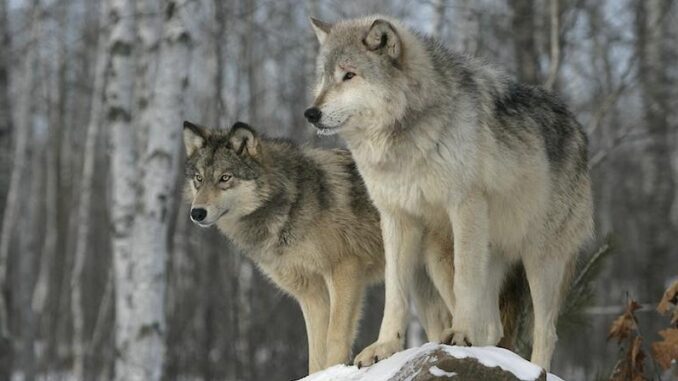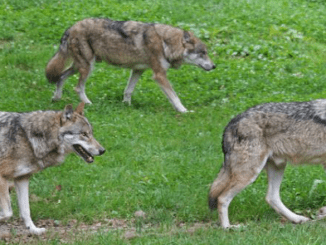
DENVER, Colorado, December 17, 2023 (ENS) – U.S. District Court Judge Regina Rodriguez has denied a request by the Colorado cattle industry to stop imminent wolf reintroductions into the state.
Wolves are being reintroduced into Colorado after being eliminated more than 75 years ago, a move that requires planning to reduce conflict with people, especially wolf predation on livestock.
On February 10, 2022, the U.S. District Court vacated the U.S. Fish and Wildlife’s 2020 rule delisting gray wolves across the lower 48 states. The ruling returns management authority of gray wolves in Colorado to the USFWS.
The new state law, passed last year, directs the Colorado Parks and Wildlife Commission to develop a plan to restore and manage gray wolves in Colorado no later than December 31, 2023.
The statute and plan indicate wolf reintroduction efforts will require the transfer of 30 to 50 wolves in total over a three-to five-year period from other states to be released onto the Western Slope of Colorado’s Rocky Mountains.
The nonprofit Gunnison County Stockgrowers’ Association, GCSA, and Colorado Cattlemen’s Association filed a lawsuit on Monday against the Colorado Parks and Wildlife and the U.S. Fish and Wildlife Service seeking to stop the wolf releases.
The cattle groups sought a declaratory judgment and a mandatory injunction requiring the Federal Defendants to comply with the National Environmental Protection Act by preparing an environmental impact statement, EIS, on the reintroduction of wolves in Colorado, and to bar the state from releasing any wolves until the EIS was prepared and a new agreement was in place.
The livestock groups requested an immediate restraining order against the reintroduction effort, which results from a voter-approved ballot measure in November 2020.
The petitioning cattle groups argued that “GCSA and its members live in and around locations selected as potential wolf release sites and identified as having high ecological suitability for gray wolves. They said “…reintroduction of gray wolves in Colorado will cause significant adverse impacts to the properties, businesses, and other vested interests of GCSA and its members.”
In her ruling published late on Friday, Judge Rodriguez denied the petition for a restraining order, citing “data submitted to the Court by the Conservation Groups, and not rebutted by Petitioners, demonstrat[ing] that in other states with hundreds or thousands of wolves, predation affects mere fractions of a percent of total livestock populations.”
Judge Rodriguez found the agencies did comply with the National Environmental Policy Act through “extensive public involvement,” opportunities for public comment and peer review.
“While the Petitioners who have lived and worked on the land for many years are understandably concerned about possible impacts of this reintroduction, neither these possible impacts nor their assertions under the Administrative Procedures Act are sufficient for this Court to grant the extraordinary relief they seek,” the judge wrote in her ruling.
Conservation and animal welfare groups who moved to intervene in the lawsuit praised the court’s decision and pledged to continue fighting the industry’s lawsuit.
“Rejecting this unfounded restraining order request is excellent news,” said Lindsay Larris, wildlife program director at the nonprofit WildEarth Guardians, which protects and restores the wildlife, wild places, wild rivers, and the environmental health across the American West from its headquarters in Santa Fe, New Mexico.
“Colorado Parks and Wildlife and U.S. Fish and Wildlife staff have spent thousands of hours on this process, hundreds of them to ensure that livestock owner interests are heard. The court agrees that the public interest in seeing wolves reintroduced by the end of 2023, as intended by ballot measure and statue, is a priority,” Larris said.
Colorado’s livestock owners have several revenue streams to underwrite non-lethal conflict reduction and for compensation. The conservation groups argue that most are unlikely to suffer livestock losses.
In May 2023, the state Legislature passed a law, the Wolf Depredation Compensation Fund, which appropriates $525,000 for two years to cover costs as a result of livestock losses caused by wolves.
Colorado Parks and Wildlife’s wolf management plan, approved by the CPW Commission, gives livestock owners up to $15,000 for losses or to pay for injuries of domestic livestock and working animals such as cattle dogs. That level of compensation is unprecedented, the groups say.
“We are looking forward to wolves being returned to their rightful place in Colorado,” said Delaney Rudy of the nonprofit Western Watersheds Project. “The agencies went through the full and proper process, and while none of us are 100 percent happy with the management plans for wolves in Colorado, trying to thwart the will of the voters with this last minute maneuver was poor form. We’re glad the court saw through it.”
A wolf license plate was authorized by legislation to create the Born to be Wild specialty license plate. Signed by Governor Jared Polis, a Democrat, in May, the proceeds from this plate will fund nonlethal conflict prevention and reduction tools and initiatives. The plate will be available in early 2024, and all funds raised from the plate will go directly to Colorado Parks and Wildlife.
Wolf-license-plate holders help fund the prevention of conflict between livestock owners and wolves. Front Range wolf lovers can help those on the Western Slope mitigate rare, potential livestock conflicts.
“I’m relieved that the court saw right through the livestock industry’s self-serving and meritless arguments,” said Allison Henderson, Southern Rockies director at the nonprofit Center for Biological Diversity. “Both science and Colorado voters have very clearly told us that wolves belong here. Once wolves are reintroduced, they’ll help restore balance to our state’s ecosystems.”
“This meritless lawsuit is nothing more than a desperate attempt by those hostile to wolves to circumvent the will of Colorado voters at the eleventh hour,” said Nicholas Arrivo, managing attorney for the nonprofit Humane Society of the United States. “Wolves belong in Colorado, and we stand ready to ensure their restoration can continue as planned.”
The non-profit organizations are represented in this litigation by Earthjustice and the Western Environmental Law Center.
“The court’s opinion vindicates that the lawsuit ignores reality,” said Tom Delehanty, an attorney with Earthjustice’s Rocky Mountain Office. “State and federal personnel put years of work into into preparing for wolves’ return to Colorado, and this misguided attack on that process has rightly failed.”
“Livestock interests hostile to wolf coexistence are abusing the law to get their way, even when the state bent over backward to accommodate them in how wolf reintroduction – scientifically supported and democratically decided through a ballot measure – is accomplished,” said Kelly Nokes, attorney at the public interest Western Environmental Law Center. “The court made the right call here denying the livestock associations’ request to block wolf releases before the case is even heard. I will work on behalf of our clients to move wolf reintroduction forward in Colorado.”
Finally, Colorado State University is establishing its own Wolf Conflict Reduction Fund to support the efforts of Colorado State University and partners to implement on-the-ground, nonlethal tools to assist livestock producers and local communities in regions with wolves. Proactive, nonlethal approaches to prevent conflict are available, including fencing, flagging, scare devices, guardian dogs, range riders, and livestock management practices. Contributions to the Wolf Conflict Reduction Fund will support research, education, and outreach efforts to reduce conflict with wolves.
Featured image:



